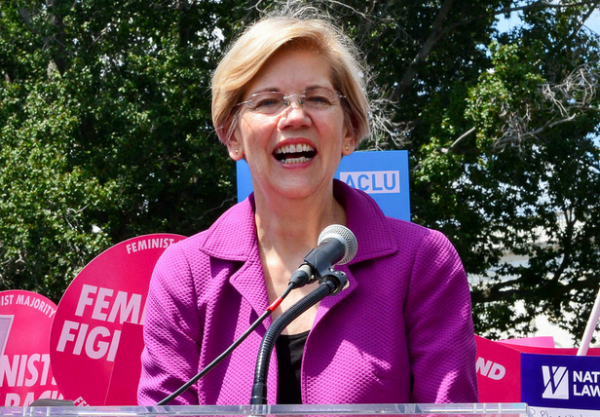Warren Blames ISPs, FCC, for Digital Divide

The smarter way to stay on top of broadcasting and cable industry. Sign up below
You are now subscribed
Your newsletter sign-up was successful
As presidential candidate Elizabeth Warren sees the digital divide, ISPs and the FCC are the problem, and a "public broadband" option is the solution.
Warren, a Democratic senator from Massachusetts, continued her assault on the commercial ISPs who have used private risk capital to build out broadband to 90%-plus of the population. That came in an op ed Wednesday (Aug. 28) in The Washington Post.
As she did in unveiling her plan earlier in the month, Warren blames ISPs--she calls out Comcast, Charter, AT&T, Verizon by name--for the digital divide and brands "former Verizon lawyer" and current FCC chair Ajit Pai as an "effective agent" for those ISPs.
Related: NCTA Praises Broadband Fund Coordination Effort
Warren is proposing to create an Office of Broadband Access that would hand out $85 billion in deployment subsidies, but only to "electricity and telephone cooperatives, nonprofit organizations, tribes, cities, counties and other state subdivisions." Those would have to offer at least 100 Mbps service.
She also has a litmus test for commissioner appointments: "I would appoint FCC commissioners who would restore net neutrality and make sure our government programs live up to the promise of universal service."
She said in the Post op ed that she would "prohibit the range of sneaky maneuvers that giant private providers use to unfairly squeeze out competition, hold governments hostage and drive up prices."
The smarter way to stay on top of broadcasting and cable industry. Sign up below
She did not say exactly what those were, but left no doubt there was no love lost for commercial broadband operators.
"Horror stories starring giant Internet companies are practically universal," she said. "In the wealthiest country on the planet, we lag behind many other developed nations in connectivity and speed, while also paying more for that service. That’s why companies such as Comcast consistently rank as the United States’ most hated companies by consumers."
But she did not confine her criticism to Comcast. She said ISPs have been "fostering pseudo-monopolies" by spending a lot to keep the regulatory environment "murky," abetted by Pai, who she said had gutted net neutrality, tried to prevent cities from building out their own broadband, and attempted to "gut" the lifeline subsidy.
Warren said ISPs "have deliberately restricted competition, kept prices high and used their armies of lobbyists to persuade state legislatures to ban towns and cities from building their own public networks. Meanwhile, the federal government has shoveled more than a billion in taxpayer dollars per year to private ISPs to expand broadband to remote areas, but these providers have done the bare minimum with these resources."
An FCC spokesperson also weighed in following the publication of Warren's op ed.
“Under Chairman Pai’s leadership of the FCC, the digital divide has been closing, average Internet speeds have substantially increased, and we’ve seen fiber deployed to more homes in a single year than any previous year in American history," the spokesperson said. "Chairman Pai has also instituted innovative reforms to the Commission’s universal service programs that are expanding broadband deployment across rural America in a cost-efficient manner. Indeed, the Commission just approved $4.9 billion last week for rural broadband deployment. So notwithstanding the hot air that campaign season brings, the truth is that his approach is producing real results and delivering digital opportunity to people across our country.”
Small-government group FreedomWorks pushed back on the attack on Pai as well as Warren's public broadband proposal.
"The attacks leveled by Elizabeth Warren against Ajit Pai are both shameful and without merit," said FreedomWorks president Adam Brandon. "Chairman Pai's tenure at the FCC has been characterized by scaling back government involvement to allow free and open competition in the market. On the other hand, Senator Warren's proposal for national public broadband would decrease Internet quality for millions of Americans and require taxpayers to foot the massive bill. The municipal broadband model has failed almost everywhere it's been attempted."
Contributing editor John Eggerton has been an editor and/or writer on media regulation, legislation and policy for over four decades, including covering the FCC, FTC, Congress, the major media trade associations, and the federal courts. In addition to Multichannel News and Broadcasting + Cable, his work has appeared in Radio World, TV Technology, TV Fax, This Week in Consumer Electronics, Variety and the Encyclopedia Britannica.

